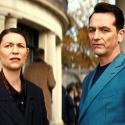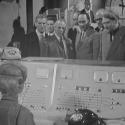This adaptation of Jennifer Worth's memoirs about life as a midwife in 1950s east London has been a spectacular and instant hit, though it's difficult to believe its success can be solely due to its graphic scenes of screaming, blood-drenched childbirth. And at 8pm on a Sunday, too.
Nor is the show's milieu of poverty-stricken tenements in London's unreformed Docklands, with the funnels of huge liners looming up at the end of the street, especially conducive to jollity and good cheer. The stories woven through the ongoing depiction of the lives of a group of young midwives, and the nuns of Nonnatus House with whom they're billeted, have included teenage prostitution and illegal abortion, how to deal with a breech birth, and sexually transmitted diseases (via a pregnant woman suffering from an untreated syphilitic chancre). Last night, we had a frisson of racial tension in the story of Winnie Lawson, who had to reveal to her faithful white middle-aged husband Ted that she'd given birth to a black baby.
 Fifties midwifery apparently involved a bit of general-purpose social work too. The prim but determined Jenny Lee (Jessica Raine) did her best to help old soldier Joe Collett (Roy Hudd, pictured right), who was approaching a dismal and lonely death in his bug-infested flat. Jenny gave the old boy a boost by escorting him to a Scots Guards reunion, but when he was evicted from his decaying tenement and rehoused in a hostel in Mile End, the game was up and the end was nigh.
Fifties midwifery apparently involved a bit of general-purpose social work too. The prim but determined Jenny Lee (Jessica Raine) did her best to help old soldier Joe Collett (Roy Hudd, pictured right), who was approaching a dismal and lonely death in his bug-infested flat. Jenny gave the old boy a boost by escorting him to a Scots Guards reunion, but when he was evicted from his decaying tenement and rehoused in a hostel in Mile End, the game was up and the end was nigh.
Yet there's a disconnect between the sometimes stomach-turningly grim subject matter and the patina of comfiness which has been sprayed over the production. The costumes have those metaphorical Props Department labels still attached and there's a stagey cosiness about the sets and backdrops, with boisterous Cockneys dancing the hokey cokey in the streets amid lines of washing while the occasional carefully-preserved Wolseley motors past, trying not to bump into anything for fear of sending insurance premiums rocketing. There's a voice-over by Vanessa Redgrave, as the much older Jenny Lee looking back over her past, which delivers homilies about life, death and all the hard lessons the young Jenny learned. It's gratingly trite, and its intermittent appearances suggest that nobody has much confidence in it.
 What makes ...Midwife fly is the interplay between its excellent cast. Jenny Agutter (pictured left with Jessica Raine and Pam Ferris) exercises firm but good-humoured leadership as nun-in-chief Sister Julienne, brushing aside Jenny's nice-girl squeamishness about the horrific poverty she's confronted with and ordering her to get out and get on with it. Pam Ferris's Sister Evangelina is the Nonnatus sergeant-major, barking orders and giving short shrift to any kind of backsliding or incompetence. As the slightly barmy Sister Monica Joan, Judy Parfitt gets the idiot savant role, mixing up rambling quotes from the great poets with flashes of subversive insight.
What makes ...Midwife fly is the interplay between its excellent cast. Jenny Agutter (pictured left with Jessica Raine and Pam Ferris) exercises firm but good-humoured leadership as nun-in-chief Sister Julienne, brushing aside Jenny's nice-girl squeamishness about the horrific poverty she's confronted with and ordering her to get out and get on with it. Pam Ferris's Sister Evangelina is the Nonnatus sergeant-major, barking orders and giving short shrift to any kind of backsliding or incompetence. As the slightly barmy Sister Monica Joan, Judy Parfitt gets the idiot savant role, mixing up rambling quotes from the great poets with flashes of subversive insight.
 The contrasting midwifery trio of Jenny, Cynthia (Bryony Hannah) and Trixie (Helen George) has been given a hefty adrenalin shot in the backside by the arrival of Miranda Hart (pictured right) as Camilla Fortescue-Cholmeley-Browne (known to all as Chummy). Tall, gawky, bespectacled and impossibly posh, with a background in the British Raj, Chummy brings a mix of knockabout physical comedy and a big-hearted determination to do the right thing, even if her East End posting is only a stepping stone towards her ambition of becoming a missionary in Africa. Hart's ungainly physical bulk was fully exploited in scenes where she learned to ride a bicycle, almost killing her fellow midwives and Constable Noakes (Ben Chaplin) in the process. But she also has the rare gift of empathy with her patients, as Dr Turner (Stephen McGann) admiringly pointed out.
The contrasting midwifery trio of Jenny, Cynthia (Bryony Hannah) and Trixie (Helen George) has been given a hefty adrenalin shot in the backside by the arrival of Miranda Hart (pictured right) as Camilla Fortescue-Cholmeley-Browne (known to all as Chummy). Tall, gawky, bespectacled and impossibly posh, with a background in the British Raj, Chummy brings a mix of knockabout physical comedy and a big-hearted determination to do the right thing, even if her East End posting is only a stepping stone towards her ambition of becoming a missionary in Africa. Hart's ungainly physical bulk was fully exploited in scenes where she learned to ride a bicycle, almost killing her fellow midwives and Constable Noakes (Ben Chaplin) in the process. But she also has the rare gift of empathy with her patients, as Dr Turner (Stephen McGann) admiringly pointed out.
Dr Turner is also tasked with delivering public service announcements about the splendours of the new-fangled NHS and Britain's marvellous Welfare State ("ten years ago these kind of medical facilities wouldn't have been available! And there's no charge!"), though with the air currently filled with debate about the future of the NHS and capping welfare payments, it's hard to know whether to treat this stuff as propaganda or irony. Whatever it is, Call the Midwife provokes thought on how drastically British society has changed in 50 years.















Add comment